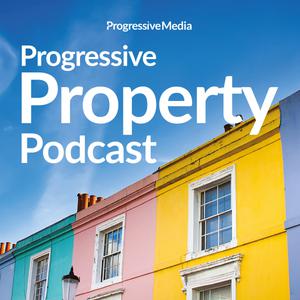
The Property Nomads Podcast
Rob Smallbone & Aaron Devoy
Property Nomads brings property and all things currency, money and macro straight to you. All with a no-nonsense attitude! EVENT MENTIONED ON PODCAST https://progressiveproperty.online/live-multiple-streams-of-property-income-interest-london/AMB4692 WHERE TO FIND US = https://linktr.ee/thepropertynomadspodcast SOVEREIGN MAN PREMIUM INTELLIGENCE MEMBERSHIP = https://dash.sovereignman.com/a/smc12m995/tpnpodcast SOVEREIGN MAN 4th PILLAR = https://dash.sovereignman.com/a/4pmain/tpnpodcast PROPERTY BOOKS Property FAQs = https://amzn.to/3MWfcL4 Buy To Let: How To Get Started = https://amzn.to/3genjle 101 Top Property Tips =
- 9 minutes 27 seconds5 plants to avoid in housing
Rob lists the five plants that homeowners, landlords, and tenants should avoid due to their potential negative impact on properties. The episode highlights invasive species such as Japanese knotweed, bamboo, rhododendron, buddleia, and English ivy, detailing how these plants can cause structural damage, compete for resources, and complicate mortgage and insurance processes.
KEY TAKEAWAYS
- Japanese Knotweed: This invasive plant grows rapidly and can penetrate through soil and concrete, leading to potential structural damage. It's crucial to identify it during house viewings, as it can complicate mortgage approvals.
- Bamboo: Known as the fastest-growing plant, bamboo can quickly overtake gardens and disrupt paving, patios, and driveways due to its strong root system. While it can be aesthetically pleasing, it requires careful management.
- Rhododendron: These plants can grow very large and compete for light and nutrients with other plants. They are also toxic to dogs, making them a concern for pet owners renting properties.
- Buddleia: Although visually appealing, buddleias can grow in hard-to-reach areas like chimney stacks and roofs, leading to potential damage and water ingress. They produce a significant number of seeds, which can contribute to their invasive nature.
- English Ivy: Commonly seen on buildings, English ivy can spread rapidly and infiltrate cracks in structures, causing water ingress and structural issues. While it adds aesthetic value, it can pose risks to the integrity of a home.
BEST MOMENTS
"The first plant to really watch out for is Japanese knotweed... it can force its way into anywhere basically."
"Bamboo is the fastest growing plant in the world... the roots can overtake a garden, it can push up paving slabs, patios, driveways."
"Rhododendrons can grow to be very, very big... and also the plants are poisonous to dogs."
"Even small buddleias are capable of producing over one million seeds a year... they can become quite invasive."
"English ivy... its roots will go through cracks in the structures... leading to all forms of water ingress and structural issues potentially for the home."
VALUABLE RESOURCES
GET YOUR PROPERTY DEVELOPMENT FINANCE HERE:
https://propertyfundingplatform.com/WharfFinancial#!/borrowerinitialregistration
SOCIAL MEDIA/CONTACT US
https://linktr.ee/thepropertynomadspodcast
BOOKS
Property FAQs = https://amzn.to/3MWfcL4
Buy To Let: How To Get Started = https://amzn.to/3genjle
101 Top Property Tips = https://amzn.to/2NxuAQL
23 January 2025, 12:00 am - 13 minutes 24 secondsEnergy policy latest incl. Heat Pumps & Gas Boilers
Rob looks into the contentious topic of heat pumps versus gas boilers within the context of the UK's energy policy. With a critical eye, he discusses the government's shifting stance on energy solutions, including the potential abandonment of plans to ban new gas boilers by 2035.
KEY TAKEAWAYS
- There is a strong skepticism regarding the effectiveness of heat pumps in the UK, particularly due to the age and structure of much of the housing stock, which may not be suitable for such systems.
- The UK government's energy policies have been inconsistent, with frequent changes regarding the ban on gas boilers and the push for heat pumps, leading to confusion and uncertainty in the housing market.
- The financial burden of transitioning to heat pumps or other energy-efficient systems is a significant concern, as the costs can be prohibitive for many homeowners, especially when compared to traditional gas boilers.
- There is a call for increased investment in various energy sources, including fossil fuels and nuclear power, to ensure affordable energy and support economic growth, rather than solely focusing on green policies.
- A more stable and affordable energy policy could lead to increased disposable income for consumers, allowing them to make more choices regarding energy systems, including potentially opting for heat pumps in the future.
BEST MOMENTS
"It's important to have a look at the latest news because that can impact the long-term housing plan for this country."
"When you look and realize that most of our housing stock in the UK consists of some form of late Victorian or early Edwardian, heat pumps are not suitable for the housing stock in general."
"If you give someone an option of installing a heat pump that may or may not work at the cost of say 10,000 pounds, or they can get a new gas boiler for say 5,000 pounds, most people are gonna go down the gas boiler route."
"The current energy policy is not very good, to put it in a polite way."
"We need more energy. We need more nuclear. We need more gas. We need more oil. More of those things are gonna drive our economy."
VALUABLE RESOURCES
GET YOUR PROPERTY DEVELOPMENT FINANCE HERE:
https://propertyfundingplatform.com/WharfFinancial#!/borrowerinitialregistration
SOCIAL MEDIA/CONTACT US
https://linktr.ee/thepropertynomadspodcast
BOOKS
Property FAQs = https://amzn.to/3MWfcL4
Buy To Let: How To Get Started = https://amzn.to/3genjle
101 Top Property Tips = https://amzn.to/2NxuAQL
20 January 2025, 12:00 am - 10 minutes 3 secondsRightmove says there's a new property boom. I disagree...
Rob looks at the recent announcement by Rightmove regarding potential housing boom areas for 2025, contrasting it with the current decline in property prices in London. He delves into the latest data from Halifax, which shows a year-to-date increase of 3.3% in UK housing prices, and explore the implications of a 26% rise in new property listings compared to the previous year.
KEY TAKEAWAYS
- Rightmove has reported a significant increase in property listings, claiming a new property boom is underway, with listings up by 26% compared to the same time last year.
- The increase in listings does not necessarily indicate a property boom; it could reflect various factors such as landlords selling due to economic pressures, homeowners testing the market, or seasonal trends following the quieter months of November and December.
- The Southeast has the highest number of new listings, followed by the East of England and the Southwest, indicating regional variations in market activity.
- The ongoing imbalance between high demand for housing and low supply is a fundamental driver of price increases, as evidenced by the Halifax reporting a 3.3% year-on-year increase in housing prices.
BEST MOMENTS
"Rightmove have announced some housing boom areas for 2025... it's interesting to see that Rightmove have, to an extent, almost countered that with their latest information."
"They do say that listings... have jumped by 26% in comparison to this time last year."
"If there are a lot more homes hitting the market, that doesn't necessarily indicate the start of a new property boom."
"When you're dealing with the fundamentals of supply and demand, that's what happens. Weak supply, big demand, demand outstrips supply, prices go up."
"Take it with a pinch of salt when you read that there could be a new property boom happening."
VALUABLE RESOURCES
GET YOUR PROPERTY DEVELOPMENT FINANCE HERE:
https://propertyfundingplatform.com/WharfFinancial#!/borrowerinitialregistration
SOCIAL MEDIA/CONTACT US
https://linktr.ee/thepropertynomadspodcast
BOOKS
Property FAQs = https://amzn.to/3MWfcL4
Buy To Let: How To Get Started = https://amzn.to/3genjle
101 Top Property Tips = https://amzn.to/2NxuAQL
16 January 2025, 12:00 am - 9 minutes 49 secondsBank of England playing chicken with the mortgage market
Rob looks at the complexities surrounding the Bank of England's current monetary policy, particularly its base rate, which is held at 4.75%. With the next decision set for February 6, 2025, Rob highlights the challenges posed by persistent inflation, currently reported at 2.6%, and the implications for the mortgage and property markets.
KEY TAKEAWAYS
- The Bank of England has maintained the base rate at 4.75%, with the next decision scheduled for February 6, 2025. There are concerns about the potential for sticky and rising inflation, which complicates the decision-making process regarding interest rates.
- The official inflation rate is reported at 2.6%, but there is skepticism about this figure. Many believe that actual inflation is higher, especially when considering everyday expenses like fuel and groceries. The economic environment is characterised by persistent inflation and flatlining growth.
- The recent autumn budget has raised concerns about stagflation, where the economy experiences stagnant growth alongside high inflation. This situation poses significant challenges for the Bank of England in managing monetary policy.
- The Bank faces a difficult choice: keeping interest rates high to combat inflation could harm the mortgage and housing markets, while lowering rates might exacerbate inflation and create a housing bubble. This creates a "damned if you do, damned if you don't" scenario.
BEST MOMENTS
"The Bank of England held rates at 4.75%. The official inflation rate... is at 2.6%. But if you put fuel in your car or go to the supermarket, you're probably finding that prices are going up a little bit more than that."
"They're almost in a damned if you do, damned if you don't situation... If they keep rates up to deal with inflation, then mortgages and the housing market might struggle."
"Rachel Reeves also somehow managed to produce a budget that was inflationary and possibly at the same time deflationary. I'm not sure I've ever seen that before in my life."
"Energy is the economy. Without being self-sustained in energy, that's going to lead to all sorts of issues."
"If you lower rates, I just think it's gonna lead to a much bigger drop moving forward."
VALUABLE RESOURCES
GET YOUR PROPERTY DEVELOPMENT FINANCE HERE:
https://propertyfundingplatform.com/WharfFinancial#!/borrowerinitialregistration
SOCIAL MEDIA/CONTACT US
https://linktr.ee/thepropertynomadspodcast
BOOKS
Property FAQs = https://amzn.to/3MWfcL4
Buy To Let: How To Get Started = https://amzn.to/3genjle
101 Top Property Tips = https://amzn.to/2NxuAQL
13 January 2025, 12:00 am - 7 minutes 24 secondsProperty Prices Falling in London - beware the ripple effect
Rob discusses the recent decline in house prices in London, highlighting that while the media may exaggerate the situation, the reality shows only modest decreases in certain boroughs. Using data from Halifax, he explores the implications of these trends, noting that London often sets the tone for the rest of the UK housing market.
KEY TAKEAWAYS
- House prices in London have seen a slight decline, with areas like Westminster and Ealing experiencing drops of 3.5% and nearly 5%, respectively. However, these declines are not as dramatic as some reports suggest.
- London has a high house price to earnings ratio of 8.22, making it one of the least affordable places in the UK, compared to the national average of 6.55.
- While some areas in London are experiencing price declines, other regions in the UK, such as Stoke-on-Trent and Slough, have seen significant increases in house prices, with rises of 17.2% and 15%, respectively.
- London often sets the trend for the rest of the UK housing market. A decline in London’s house prices could lead to similar trends in other regions, indicating potential challenges ahead for the national housing market.
- Despite current fluctuations, demand for housing in the UK remains higher than supply. This creates opportunities for investors, especially if they are prepared to act quickly when prices drop further.
BEST MOMENTS
"House prices have tumbled across swathes of London, but in reality, they're down by a couple of percent."
"London has a house price to earnings ratio of 8.22, making it one of the least affordable places to live in the country."
"If London is doing well housing-wise, chances are the rest of the country is going to be doing well housing-wise."
"There are always opportunities in the market, and demand for housing in the UK is significantly higher than supply."
"If a lot of the boroughs are starting to see declines in house prices, then that will have a ripple effect on the rest of the country."
VALUABLE RESOURCES
GET YOUR PROPERTY DEVELOPMENT FINANCE HERE:
https://propertyfundingplatform.com/WharfFinancial#!/borrowerinitialregistration
SOCIAL MEDIA/CONTACT US
https://linktr.ee/thepropertynomadspodcast
BOOKS
Property FAQs = https://amzn.to/3MWfcL4
Buy To Let: How To Get Started = https://amzn.to/3genjle
101 Top Property Tips = https://amzn.to/2NxuAQL
9 January 2025, 12:00 am - 8 minutes 5 seconds6 x 2025 Predictions
Rob shares bold predictions for 2025, including expectations for gold prices to soar to $3,000 before retreating to $2,200, and a worldwide recession that could surpass the Great Depression of 1929. He speculates on political changes, predicting that Sir Keir Starmer will be ousted as Prime Minister by the end of the year. Additionally, there are forecasts for oil prices to drop to $50 a barrel and the Bank of England's base rate to decrease to 4%, accompanied by rising inflation.
KEY TAKEAWAYS
- It is anticipated that gold will rise to $3,000 before experiencing a sell-off down to $2,200, influenced by market trends and potential economic downturns.
- A significant worldwide recession is predicted for 2025, potentially worse than the Great Depression of 1929, driven by unsustainable financial practices and market valuations.
- There is an expectation that Sir Keir Starmer will be ousted as Prime Minister, leading to the installation of a new Prime Minister by the end of the year.
- Oil prices are projected to drop to $50 per barrel for Brent crude, influenced by economic slowdowns and recession fears.
- The Bank of England's base rate is expected to decrease to 4%, while inflation is predicted to rise again, despite current figures suggesting lower rates.
BEST MOMENTS
"Sir Keir Starmer will be ousted as Prime Minister... I think something's going to happen where he is ousted as Prime Minister."
"Oil has been slowly going on a downward spiral for a while... that will normally send oil lower."
"I believe that the Bank of England will drop that down to 4%. That wouldn't be the right thing to do at all, in my opinion, but I believe it will happen."
"I think a new international monetary system will be officially announced... it could be anything."
VALUABLE RESOURCES
GET YOUR PROPERTY DEVELOPMENT FINANCE HERE:
https://propertyfundingplatform.com/WharfFinancial#!/borrowerinitialregistration
SOCIAL MEDIA/CONTACT US
https://linktr.ee/thepropertynomadspodcast
BOOKS
Property FAQs = https://amzn.to/3MWfcL4
Buy To Let: How To Get Started = https://amzn.to/3genjle
101 Top Property Tips = https://amzn.to/2NxuAQL
6 January 2025, 12:00 am - 7 minutes 21 seconds2024 Predictions Review
Rob reflects on his property finance and macro predictions for 2024, assessing the accuracy of each forecast made at the beginning of the year. The predictions covered a range of topics, including gold prices, the Bank of England's base rate, the commercial property market, house prices, oil prices, and a wildcard prediction regarding the U.S. presidential election...
KEY TAKEAWAYS
- The prediction that gold would hit $2,500 was accurate, with gold peaking at $2,800 later in the year, marking it as one of the best-performing assets.
- The expectation that the Bank of England would increase its base rate to at least 7% was incorrect, as the rate remained significantly lower, around 4.5% to 4.75%.
- The prediction of a collapse in the commercial property market did not materialise, as the market remained stable in the UK despite some global concerns.
- The forecast that house prices would increase by 5% year-on-year was also incorrect, with data showing a slight decline of 0.3% compared to the previous month.
BEST MOMENTS
"The first prediction was that gold would hit $2,500 amid economic meltdown. Now, I'm going to give myself a point for this because gold certainly hit $2,500 at the latter end of the year."
"The second prediction was that the Bank of England would increase its base rate to at least 7%. This is completely incorrect. I haven't fared well with this."
"The third prediction was that the commercial property market collapses. Again, I have to give myself a big X on the spot for that one. That hasn't happened."
VALUABLE RESOURCES
GET YOUR PROPERTY DEVELOPMENT FINANCE HERE:
https://propertyfundingplatform.com/WharfFinancial#!/borrowerinitialregistration
SOCIAL MEDIA/CONTACT US
https://linktr.ee/thepropertynomadspodcast
BOOKS
Property FAQs = https://amzn.to/3MWfcL4
Buy To Let: How To Get Started = https://amzn.to/3genjle
101 Top Property Tips = https://amzn.to/2NxuAQL
2 January 2025, 12:00 am - 13 minutes 56 secondsWhy the new Green Energy bill will impact us ALL
Rob examines the complexities of green energy policy and its implications for individuals and property investors in the UK. Emphasising the need for a cleaner and greener environment, the discussion highlights the potential economic burdens that may arise from the government's aggressive decarbonisation goals by 2030.
KEY TAKEAWAYS
- The current green energy policies in the UK are viewed as unsustainable and potentially harmful to the economy, leading to higher energy bills for households and property investors.
- The goal to decarbonise the electricity grid by 2030 is seen as unrealistic, with significant changes required that may not be suitable for the population, potentially resulting in increased costs.
- Nuclear energy is presented as the cleanest and most reliable baseload energy source, necessary for achieving a greener grid, especially as wind and solar are intermittent and cannot solely meet energy demands.
- The push for green energy and the associated subsidies will ultimately lead to increased standing charges and energy prices, affecting lower-income households the most and creating a cycle of financial strain.
BEST MOMENTS
"What the government in the UK are trying to do is not sustainable and not suitable, and it really is making us all poorer."
"To decarbonise the electricity grid in five years is, in my opinion, not good."
"Nuclear really is the answer... if you want a greener grid and an abundance of electricity, nuclear is the way forward."
"We're making ourselves poorer by design... all of those investments, all of those subsidies get passed along to us through a standing charge."
"When you tell them it's gonna cost them hundreds and possibly thousands of pounds per person, that's when you're gonna get resistance."
VALUABLE RESOURCES
GET YOUR PROPERTY DEVELOPMENT FINANCE HERE:
https://propertyfundingplatform.com/WharfFinancial#!/borrowerinitialregistration
SOCIAL MEDIA/CONTACT US
https://linktr.ee/thepropertynomadspodcast
BOOKS
Property FAQs = https://amzn.to/3MWfcL4
Buy To Let: How To Get Started = https://amzn.to/3genjle
101 Top Property Tips = https://amzn.to/2NxuAQL
30 December 2024, 12:00 am - 9 minutes 57 secondsGas boilers to be banned in NEW Homes from 2027
Rob looks at the impending ban on gas boilers in new homes, set to take effect in 2027 as part of the government's Future Homes Standard aimed at reducing carbon emissions. He delves into the implications of this legislation for developers and homeowners, highlighting concerns about increased construction costs, potential planning issues, and the strain on the electricity grid.
KEY TAKEAWAYS
- Gas Boiler Ban: The UK government plans to ban gas boilers in new homes starting in 2027 as part of the Future Homes Standard aimed at reducing carbon emissions.
- The transition to electric heat pumps and non-gas alternatives is expected to increase construction costs, which will likely be passed on to homebuyers, potentially making housing less affordable.
- The shift to electric heating systems raises concerns about the capacity of the electricity grid, which may struggle to handle the increased demand, leading to potential reliability issues.
- Relying solely on electric heat pumps could create vulnerabilities, as a power outage would leave homes without heating or hot water, emphasizing the need for backup systems.
- The current energy policies are viewed as flawed, with high electricity prices and a lack of diverse energy options, leading to skepticism about the effectiveness and sustainability of the proposed changes.
BEST MOMENTS
"Gas boilers are likely to be banned in new homes from 2027 as part of legislation being brought forward by the government."
"If you're trying to force everyone down this net zero route, what is going to happen is that the cost of putting in heat pumps... would increase."
"You're putting all your eggs in one basket... if the grid goes down and you're running off a heat pump, then you're screwed."
"Banning gas boilers, not a good thing in my opinion... they're making us poorer, I think, by design."
"We should always have the option, if you want gas, have gas. If you don't want gas and you want a heat pump, go for it."
VALUABLE RESOURCES
GET YOUR PROPERTY DEVELOPMENT FINANCE HERE:
https://propertyfundingplatform.com/WharfFinancial#!/borrowerinitialregistration
SOCIAL MEDIA/CONTACT US
https://linktr.ee/thepropertynomadspodcast
BOOKS
Property FAQs = https://amzn.to/3MWfcL4
Buy To Let: How To Get Started = https://amzn.to/3genjle
101 Top Property Tips = https://amzn.to/2NxuAQL
26 December 2024, 12:00 am - 9 minutes 20 secondsSeasons Greetings and top tips for having a productive festive period
Rob extends warm Christmas and New Year wishes to you, the listeners while encouraging you to take a break from business stresses and enjoy quality time with family and friends. He shares valuable tips for reflecting on the past year and planning for the upcoming one, emphasising the importance of goal setting and strategic networking in the property market.
KEY TAKEAWAYS
- The holiday season is a valuable opportunity to spend quality time with friends and family, allowing for a mental break from business stresses and personal challenges.
- Use the festive period to reflect on the past year, assess what went well and what didn’t, and set clear goals for the upcoming year. Writing down these goals is crucial for achieving them.
- Consider evaluating current property strategies and exploring new ones. Rob highlights the importance of being open to new opportunities in the property market, even if they weren't previously on your radar.
- Networking should be strategic rather than just a numbers game. Identify specific goals for networking, such as finding new partners or resources, and ensure that your efforts are focused and productive.
BEST MOMENTS
"It's always nice every once in a while to take your mind off of other things, maybe business stresses or things in your personal life."
"Half the time, goal setting is very important, because it's okay having it in your head, but once you've written it down, that's the first step to achieving it."
"There are always deals out there. There are always opportunities out there."
"When you go networking, what are you looking to try and do? What's the aim of networking?"
VALUABLE RESOURCES
GET YOUR PROPERTY DEVELOPMENT FINANCE HERE:
https://propertyfundingplatform.com/WharfFinancial#!/borrowerinitialregistration
SOCIAL MEDIA/CONTACT US
https://linktr.ee/thepropertynomadspodcast
BOOKS
Property FAQs = https://amzn.to/3MWfcL4
Buy To Let: How To Get Started = https://amzn.to/3genjle
101 Top Property Tips = https://amzn.to/2NxuAQL
23 December 2024, 12:00 am - 14 minutes 32 secondsA big landlord exodus will happen - here's why
Rob discusses the impending landlord exodus expected to impact the UK housing market from 2025 onwards. Citing the latest English Private Landlord Survey, he highlights a significant increase in landlords considering selling their properties, rising from 22% in 2021 to 31% in 2024. The discussion delves into the various factors contributing to this trend, including recent legislative changes, rising mortgage costs, and the challenges posed by the Renters Reform Bill.
KEY TAKEAWAYS
- A significant increase in landlords considering selling their properties is anticipated, with the percentage rising from 22% in 2021 to 31% in 2024. This trend could lead to a decrease in rental housing supply.
- The potential exodus of landlords may result in higher rental prices due to decreased supply, despite the government's intentions to protect renters through new legislation.
- Recent legislation, including the Energy Performance Certificate (EPC) regulations and the Renters Reform Bill, has contributed to landlords' decisions to sell, as many feel the environment has become increasingly unfavourable.
- Rising mortgage costs and inflation are putting additional pressure on landlords, making it more challenging to maintain profitability in the rental market.
BEST MOMENTS
"There will be a devastating landlord exodus that will hit Britain from 2025 onwards, and it's a culmination of a lot of factors."
"If the supply of available housing for rent decreases... then what happens is an increase in prices."
"Just under two-thirds have blamed the recent legislation changes for the decision."
"Landlords have been operating in an increasingly unfriendly environment."
"If all these properties were sold... that leaves a smaller pool of rental properties that are available."
VALUABLE RESOURCES
GET YOUR PROPERTY DEVELOPMENT FINANCE HERE:
https://propertyfundingplatform.com/WharfFinancial#!/borrowerinitialregistration
SOCIAL MEDIA/CONTACT US
https://linktr.ee/thepropertynomadspodcast
BOOKS
Property FAQs = https://amzn.to/3MWfcL4
Buy To Let: How To Get Started = https://amzn.to/3genjle
101 Top Property Tips = https://amzn.to/2NxuAQL
19 December 2024, 12:00 am - More Episodes? Get the App
Your feedback is valuable to us. Should you encounter any bugs, glitches, lack of functionality or other problems, please email us on [email protected] or join Moon.FM Telegram Group where you can talk directly to the dev team who are happy to answer any queries.
 Your Property Podcast
Your Property Podcast
 The Progressive Property Podcast
The Progressive Property Podcast
 The Money Podcast
The Money Podcast
 Tej Talks - Property
Tej Talks - Property
 The Property Podcast
The Property Podcast
 The Inside Property Investing Podcast | Interviewing Inspiring & Successful Property and Real Estate Investors
The Inside Property Investing Podcast | Interviewing Inspiring & Successful Property and Real Estate Investors